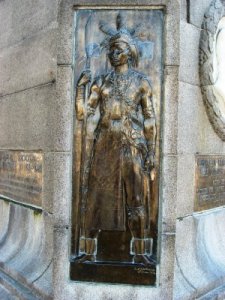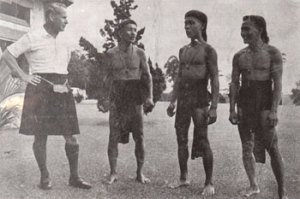Rentap

Rentap's Monument, Kuching, Sarawak
Rentap or Libau (died 1863) was a famous Dayak (Iban) warrior in Sarawak, Malaysia during the Brooke White Rajahs era in that state. “Rentap” in Iban means “Shaker of the world”. He was known as “Raja Darat” or “Raja Ulu”. Essentially, Rentap’s rebellion was due to the White Rajah’s or James Brooke’s action of eliminating the Ibans in Skrang because he thought they were pirates. Being a leader of the Ibans there, Rentap took the subsequent action of attacking James Brooke’s fort at Skrang River called Nanga Skrang. James’ then burnt Rentap’s village after he successfully drove James Brooke’s side out of Skrang.
He retreated to Bukit Sadok and built himself a fort after a defeat at Sungai Lang, Ulu Skrang by James Brooke in the year 1854. There he gained a reputation and thwarted many plans by James Brooke to control the Skrang and Saribas areas. Only after many attempts and with the aid of bigger cannons did James Brooke defeat Rentap in the year 1861. Though defeated, Rentap never officially surrendered. He retreated to Sungai Entabai and died in same place. In Malaysia, he is not only renowned in Sarawak, but he is also a national hero in both Sabah and the Peninsula as both a national hero and a freedom fighter.
Rentap’s battlecry was Agi Idup, Agi Ngelaban!! which means I will fight as long i will live!!.This legendary battlecry later become Malaysia’s Royal Ranger Regiment motto.
Tun Temenggung Jugah Anak Barieng

Tun Temenggung Jugah Anak Barieng
Tun Temenggong Jugah Anak Barieng or Tun Jugah (1903 – July 1981) was a Malaysian politician of Iban descent from the state of Sarawak. He was the first Sarawakian Minister in the Malaysian Federal Parliament. He played a fundamental role in bringing the state of Sarawak into the Federation of Malaysia in 22 July 1963. He was a member and president of the United Traditional Bumiputera Party until his death in 1981
Jugah in the words of Tun Abdul Rahman Ya’kub, former Chief Minister of Sarawak and Governor of Sarawak, ‘ was a bridge between Sarawak and Malaya.’ He was a major figure and factor in the entry of Sarawak -and the Iban- into Malaysia.
Vinson H Sutlive Jr in his book ‘Tun Jugah Of Sarawak: Colonialisme and Iban Response’ revealed Jugah’s very own philosophy, ‘Give life to yourself first. Once your foundation is solid, then you can talk and act.’ (Idup ka nyawa dulu. Udah urat tegap, baru kitai ulih bejaku). Thus, he was a chief (penghulu) of renown in the Brooke Raj, a chief (sanji) under the Japanese, and Paramount Chief (Temenggung) during the British period, and Federal Minister in Malaysia.
He was a recipient of numerous honours conferred by the state and federal governments. He received Darjah Panglima Negara Bintang Sarawak (PNBS), and the Title of Datuk, From Sarawak Goverment, and the same year, Panglima Gemilang Darjah Kinabalu (PGDK) with the title Datuk from Sabah Government. The third honour for the year, 1964, were confered by The King, with the title Tan Sri, that is Darjah Yang Mulia Panglima Mangku Negara (PMN).

Tun Jugah and HRH The Duke Of Edinburgh

Left to right: Sir Malcolm McDanald, Temenggung Jugah, Temenggung Jinggut anak Atan and Temenggung Sibat Anak Buyong
Stephen Kalong Ningkan
Datuk Amar Stephen Kalong Ningkan was the first Chief Minister of Sarawak (1963 – 1966). As the executive of a newly-independent state which helped to form Malaysia, Kalong faced many challenges from within the state and from without.
Kalong was born on 20 August 1920 in Betong, Sarawak which was then administered under the Second Division of Simanggang. He was a student of St Augustine’s school. After he completed his education, he became a Teacher, a Policeman, a Hospital Dresser at a Shell Company hospital in Kuala Belait, Brunei for several years. At the hospital, he was Chairman of the Shell Dayak Club. He also became the Founder and President of the Sarawak Dayak Association from 1958 to 1960.
He returned to Betong and established the Sarawak National Party (SNAP) in April 1961. Although he initially did not accept Tunku Abdul Rahman’s proposal on the formation of Malaysia, he eventually became a strong supporter of the federation. In the 1962 election, SNAP won many seats, earning him the trust to be Chief Minister. In addition, Kalong played an important role in forming Perikatan Sarawak, and served as its Secretary-General.
Datuk Amar Stephen Kalong Ningkan (of mixed Iban and Chinese parentage) Chinese name is Mok Teck Boon. He has seven children: Paul Murphy Ningkan, Marina Siew Ling Ningkan, Flora Ningkan, Diana Inoi Ningkan, Winston Beng Wai Ningkan, Margaret Ningkan and Gerald Bala Ningkan.
In 1966, Kalong was ousted when the state governor showed him a letter of no confidence issued by 21 out of 42 legislators and asked Ningkan to resign as chief minister.
Ningkan refused, saying the letters were not tantamount to a vote of no confidence in the state legislative assembly. He was sacked by the governor but eventually reinstated by the Borneo High Court, which saw the necessity of a formal vote of no confidence.
In his judgement, Harley A-G ruled that the governor can only dismiss the chief minister when both these conditions are satisfied:
(a) The chief minister has lost the confidence of the House, and
(b) The chief minister has refused to resign and failed to advise a dissolution.



No comments:
Post a Comment